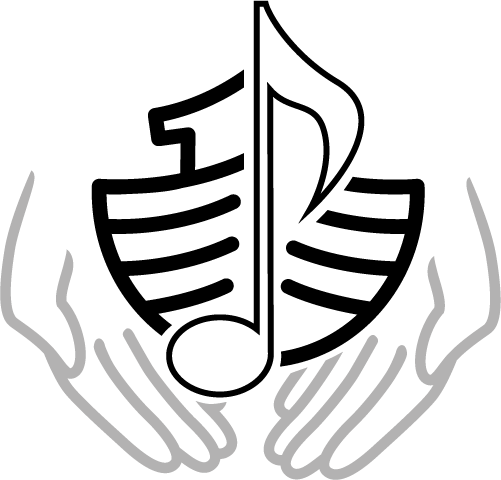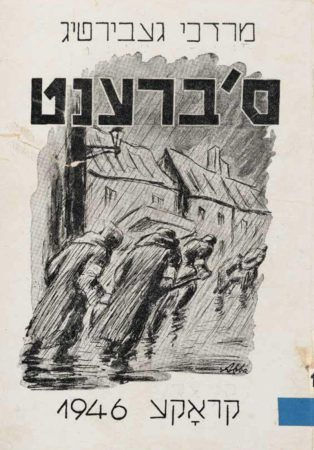es'brennt (1946)
Artist: Mordechaj Gebirtig (1877-1942)
Scientific contributions
- German Introduction by Marian Benjamin Fritsch, January 2024 – PDF
- German Translation by Marian Benjamin Fritsch – PDF
Introduction by Marian Benjamin Fritsch
January 2024
The songs and poems presented here are taken from an anthology of Yiddish works by the important Jewish-Polish poet and composer Mordechai Gebirtig, published in 1946. It contains Gebirtig's work from the years 1938-1942, which paints an impressive picture of the Jewish-Polish world in the period shortly before and during the Second World War. During this time, Gebirtig witnessed the increasing disenfranchisement, persecution and ultimately extermination of Poland's Jewish population and processed this in his literary work. His personal experience, which he expressed in his songs and poems, is exemplary of the fate not only of Polish Jews at the time.
Born on May 4, 1877 in Krakow, Gebirtig made a name for himself in the 1920s with his popular Yiddish songs and published his first collections of poetry. However, his work always reflected his very specific life experiences and when the situation of Polish Jews increasingly deteriorated in the 1930s, Gebirtig's songs and poems also changed. In the works of this period, one can clearly read the concern about the developments of the coming years, the fear for the future of Jewish life in the Polish homeland. But Gebirtig did not give in to despair; his work also contained a fighting spirit and a call for resistance. In 1938, in the face of an anti-Jewish pogrom in Przytyk, he wrote what is probably his most famous work, the song ss'brennt [It burns], also known as undser schtetl brent [Our shtetl burns], which became the unofficial anthem of Jewish partisans fighting against German barbarism during the Nazi era.
At the end of the 1930s, the situation of Polish Jews became increasingly precarious and repression and persecution by the non-Jewish Polish majority population increased. In his poem ss'tut wej [It hurts], written in February 1940, the pain caused by the growing anti-Semitism of non-Jewish Poles, the betrayal of their neighbors, becomes clear. A few months later, Mordechai Gebirtig had to leave his home in Kazimierz, the Jewish quarter of Krakow, at the behest of the German occupiers. He expressed the pain of his departure in the poem blajb gesunt mir, kroke [Farewell, Krakow], in which he bid farewell to his city and his mother's grave. Although the situation became increasingly difficult and despair grew, the fire of hope still burned within the poet. In 1942, in Łagiewniki, a suburb of Krakow, he wrote the poem a tog fun nekome [a day of revenge], in which he expressed his hope that the perpetrators would one day be brought to justice and the horror of war would end. On June 4, 1942, Mordechai Gebirtig was to be taken to the Krakow train station and deported from there to the Bełżec extermination camp. On the way to the station, he was shot by German soldiers together with his wife and two daughters.
As Josef Wolf, who was a member of the editorial board of the 1946 volume, wrote in his foreword to the edition, for Mordechai Gebirtig, writing songs and poems was his way of resisting the injustice and crimes he witnessed and which were also committed against him. This testimony to the crimes is also a reminder not to forget what happened and to remain vigilant against anti-Semitic and anti-democratic tendencies today. It is to be hoped that this translation will help to make Mordechai Gebirtig's work and his testimony to the crimes of the National Socialists accessible to a wider audience and keep the memory of what happened alive.
Marian Benjamin Fritsch,
born in Nuremberg in 1990, studied Romance studies and Yiddish language, culture and literature in Düsseldorf and Madrid. He has been working at the Johanna Stahl Center for Jewish History and Culture in Lower Franconia in Würzburg since 2022. He is also involved in various Yiddish research and editing projects with a focus on Yiddish journalism of the 20th century and works as a translator of Yiddish manuscripts and poetry.
Thanks to
On behalf of the "Arche Musica" project team, I would like to thank Marian Benjamin Fritsch for his wonderful translation, which now opens up a very special access to Mordechai Gebirtig's work. (Thomas Spindler)

